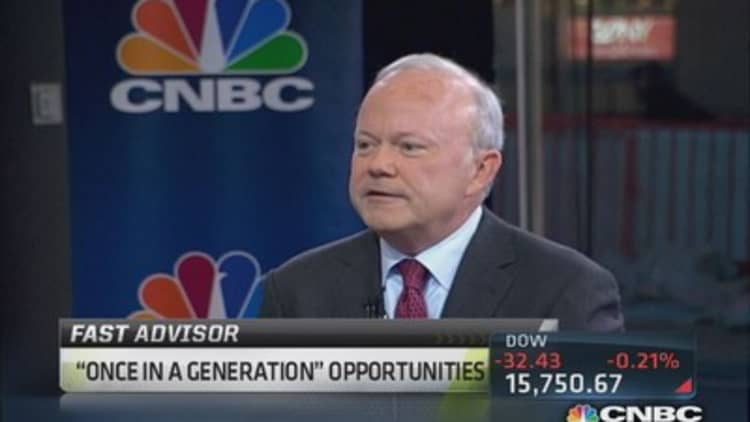
There's a certain amount of weight that comes with calling an investment idea "once in a generation," but that's exactly how Jim O'Shaughnessy described his call to short bonds.
Managing nearly $6 billion as chairman, CEO and CIO of O'Shaughnessy Asset Management, he cautioned investors in a recent note about an impending selloff in government bonds.
"Data suggests that the crisis in long bonds is coming," O'Shaughnessy wrote, adding that investors should "dramatically reduce bond maturity durations before it is too late."
(Read more: Dennis Gartman sees 'massive top' in bond market)
And if one generational call isn't enough, O'Shaughnessy paired his bearish bonds call with an equally substantial take on stocks.
There's a "generational buying opportunity in equities," he told CNBC's "Fast Money" on Tuesday.
To arrive to his sell conclusion, O'Shaughnessy looked at the performance of 20-year Treasurys over various periods. He noted that they are coming off their best 40-year period on record and that a reversion to the mean could be devastating for investors in long-duration bonds.
(Read more: No market bubble, but some froth in stocks: Traders)
As for his bullish call on stocks, O'Shaughnessy recommends that investors buy all pullbacks in the market.
"Over the next five to 10 years," he said, "equities will be the investment that does the best of any alternatives."
The bullish sentiment on equities echoes a call O'Shaughnessy made in 2009.
O'Shaughnessy said that he liked such stocks as Seagate, DirecTV, L3 Communications, Flowserve and Marathon Petroleum.
"Seagate is a great example of a stock that both, is cheap on the factors that we use in the value composite, P/E, price to cash flow, EBITDA to enterprise value, in which we amalgamate the entire group to get a listing for cheapness," he said. "Financially strong, in other words, they're not taking on a lot of debt. They're not using external financing. Quality earnings, the accruals are very low. They're not playing monkey business with the balance sheet. And then finally, earnings growth — in other words, they haven't had any downside surprises."
—By CNBC's Michael Newberg. Follow him on Twitter: @MikeNewberg.



